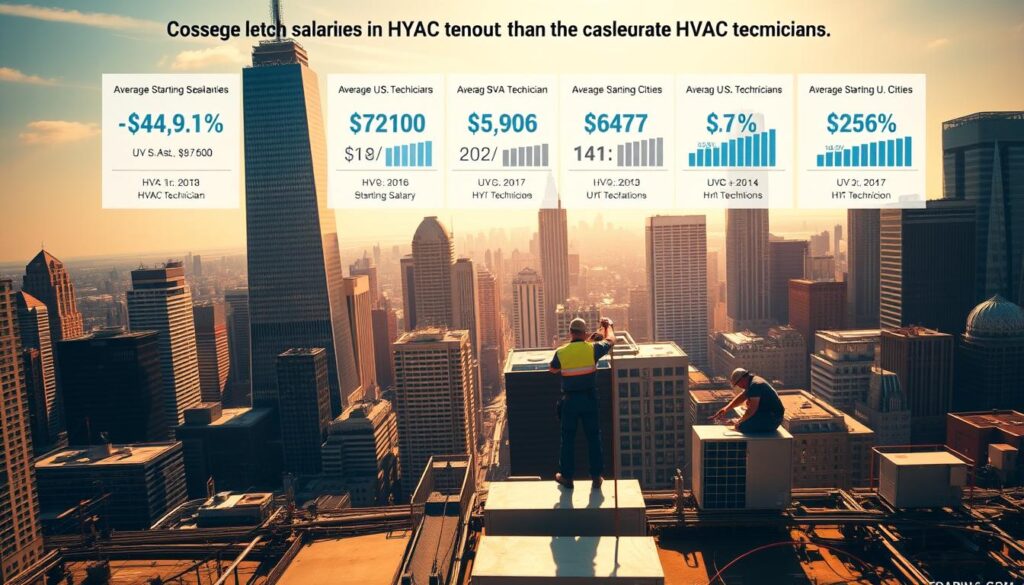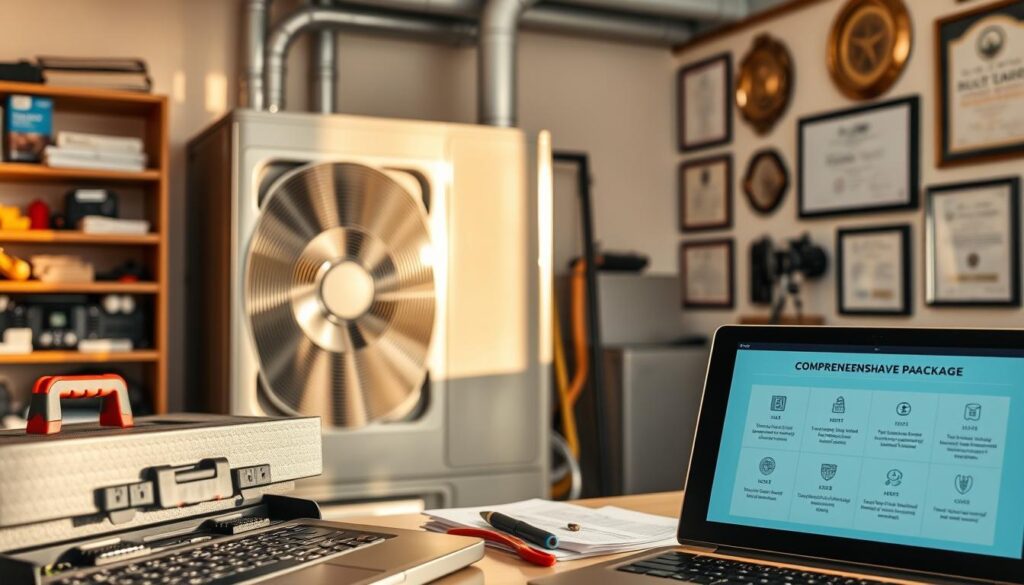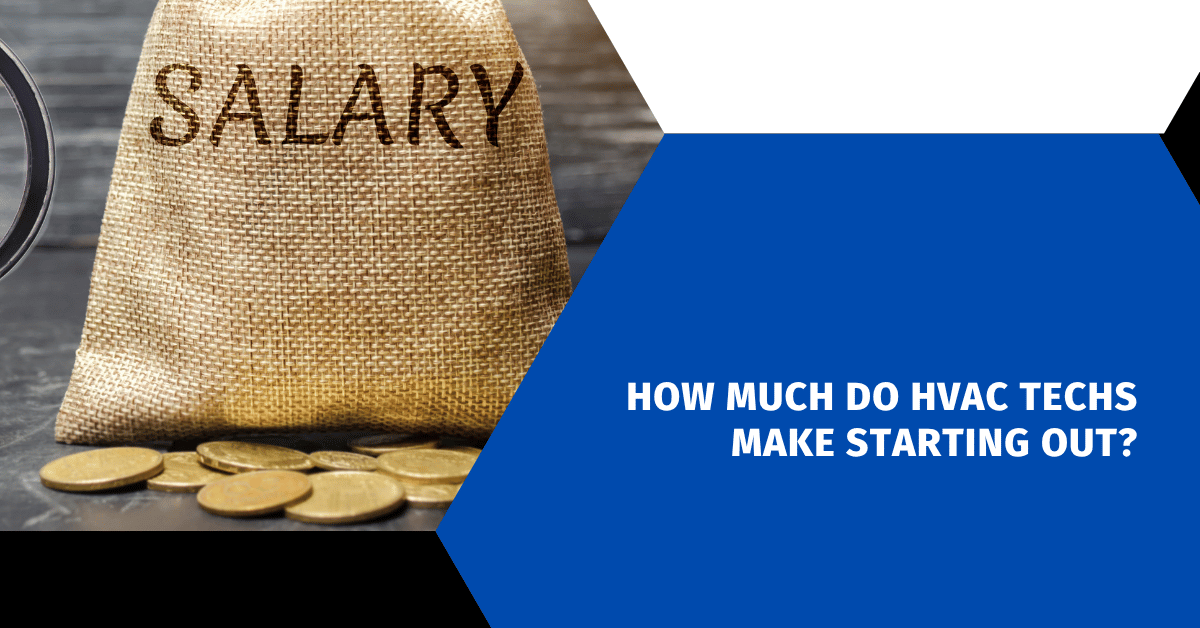Affiliate Disclosure
HVAC Guide Guys is a participant in the Amazon Services LLC Associates Program, an affiliate advertising program designed to provide a means for sites to earn advertising fees by advertising and linking to Amazon.
How Much Do HVAC Techs Make Starting Out? Are you thinking about becoming an HVAC technician? This career offers more than just technical skills. It also provides a solid financial foundation for those who are ready to start.

Looking into the starting salary of HVAC techs, you’ll find a promising landscape. Payscale reports that entry-level HVAC technicians earn around $52,000 a year. This is a great starting point for those new to this field.
The salary for HVAC technicians can change based on location, skills, and demand. Whether you’re fresh out of school or looking to change careers, knowing the salary range is key. It helps you decide if this path is right for you.
Key Takeaways
- Entry-level HVAC technicians earn an average of $52,000 annually
- Salary increases with experience and specialized skills
- Location greatly affects starting wages
- Apprenticeship programs offer valuable paid training
- HVAC careers offer stable job prospects in various industries
Table of Contents
National Average HVAC Starting Salaries in 2025
The HVAC industry is booming, with great career paths for new technicians. In 2025, starting salaries will be competitive, showing the value of the skills needed in this field.
Entry-Level Base Pay Overview
Starting your HVAC career means a good salary. The average annual pay for new HVAC techs is expected to be $54,100 in 2025. This wage is attractive, thanks to the growing need for skilled workers in the U.S.
- Median Entry-Level Salary: $54,100
- Hourly Rate Range: $20 – $28
- Potential Annual Earnings: $42,000 – $65,000
Regional Salary Variations
Your salary can change based on where you work. Some areas pay more because of higher demand and living costs.
| Region | Average Starting Salary | Job Market Demand |
|---|---|---|
| Northeast | $58,500 | High |
| West Coast | $56,800 | Very High |
| Midwest | $51,200 | Moderate |
| South | $49,700 | Growing |
Industry Growth Projections
The HVAC industry is set to grow a lot. It’s expected to see 5-7% annual growth by 2025. This means more jobs and possibly higher pay for skilled technicians.
“The future of HVAC technicians looks bright, with expanding job markets and competitive compensation packages.” – HVAC Industry Analyst
Top Paying States for Entry-Level HVAC Technicians
Starting your HVAC career can be greatly influenced by where you work. Some states pay entry-level HVAC technicians much more. This can help kickstart your career.
The top three states for entry-level HVAC technicians offer great pay:
- California: Leads with an impressive starting salary of $59,200
- New Jersey: Offers competitive wages around $58,300
- Washington: Provides strong entry-level earnings at $58,000
Your starting salary isn’t just a number. Each state has its own economic conditions that affect pay. Things like local demand, cost of living, and tech infrastructure matter a lot.
The West Coast and Northeast often have higher starting salaries for HVAC workers. This is because of strong construction markets, advanced tech, and strong unions in these areas.
Choosing the right location can increase your starting salary by thousands of dollars each year.
When planning your HVAC career, look into local markets, apprenticeships, and growth chances. This will help you make the most money.
Explore Our HVAC Shop
Looking for top-rated HVAC tools, parts, and accessories? Visit our shop and find the perfect solution for your needs.
Visit the ShopHow Much Do HVAC Techs Make Starting Out?
Starting your HVAC technician career is exciting. It offers great chances for making money and growing professionally. Knowing how much new HVAC service technicians earn can help you plan your career.
When you start in HVAC, your pay depends on several things. The average salary for new HVAC technicians is between $30,000 and $45,000 a year.
First Year Earnings Breakdown
Your first-year pay changes based on where you work, your employer, and your job. Here’s what you might earn:
- Hourly wage: $15 – $22 per hour
- Annual salary: $30,000 – $45,000
- Potential overtime: $5,000 – $10,000 extra
Apprenticeship Pay Rates
As an apprentice, you’ll earn a part of what a certified technician makes. You start at 40-50% of the journeyman rate. Your pay goes up as you learn more.
| Apprenticeship Stage | Typical Pay Rate | Annual Earnings |
|---|---|---|
| First Year | 40% of Journeyman Rate | $24,000 – $30,000 |
| Second Year | 50% of Journeyman Rate | $30,000 – $37,500 |
| Third Year | 60% of Journeyman Rate | $36,000 – $45,000 |
Commission and Bonus Opportunities
Many HVAC companies give extra pay through commissions and bonuses. Skilled technicians can earn 10-20% more than their base pay through these incentives.
Pro Tip: Work hard to improve your skills and be reliable. This will help you make more money in the HVAC field.
Major Cities with Highest Starting HVAC Salaries

Starting your HVAC career in a big city can really boost your earnings. Cities with high populations and complex buildings need skilled HVAC workers. This demand leads to higher salaries for new HVAC professionals.
The top cities for new HVAC techs in 2025 are exciting places to start:
- San Francisco: $64,200 average starting salary
- New York City: $60,600 average starting salary
- Newark: $59,900 average starting salary
These cities offer great pay for several reasons. They have lots of people, complex buildings, and extreme weather. Choosing to work in these places can greatly increase your starting salary.
Other cities also offer good salaries for HVAC newbies:
- Boston: Strong industrial and residential HVAC needs
- Chicago: Extensive commercial infrastructure
- Washington D.C.: Government and private sector opportunities
Pro tip: Look at local job demand and living costs along with salaries. This helps you make a smart career choice.
Your geographical choice can dramatically influence your initial earning in the HVAC trade.
Explore Our HVAC Shop
Looking for top-rated HVAC tools, parts, and accessories? Visit our shop and find the perfect solution for your needs.
Visit the ShopExperience-Based Salary Progression
As an HVAC technician, your salary increases with experience. Knowing how your salary changes can help you plan your career. It also sets realistic financial goals.
When looking at starting salaries for HVAC techs, remember the chance for big income growth. Your pay will go up as you learn new skills and get more experience.
Career Path Earnings Timeline
Your HVAC career usually follows this path:
- Entry-level (0-2 years): $35,000 – $45,000 annually
- Mid-level (2-4 years): $45,000 – $59,600 annually
- Experienced (4-6 years): $59,600 – $68,100 annually
- Senior technician (6-10 years): $68,100 – $85,000 annually
Skill Development Milestones
Improving your skills can speed up your salary growth. Key points include:
- Technical certifications
- Specialized equipment expertise
- Advanced diagnostic skills
- Customer service proficiency
Advanced Certification Benefits
Investing in your career can really boost your salary. Getting advanced certifications from groups like NATE can raise your pay by 10-20%.
Professional growth is the key to maximizing your HVAC career earnings.
Benefits and Compensation Packages

When you look at hvac apprentice pay, you’ll see it’s more than just a salary. Many HVAC companies give great benefits packages. These packages can really boost your earnings.
As an HVAC helper, your pay includes more than just a paycheck. You get big financial and career benefits:
- Health insurance with low costs for you
- 401(k) plans with company matches
- Paid time off and vacation days
- Allowances for tools and equipment
- Reimbursement for vehicle maintenance
For hvac helper wages, these extra benefits add up to thousands of dollars. Depending on the company, you might get:
- Annual tool allowance: $500-$1,500 for your own tools
- Bonuses based on your performance
- Support for continuing education
- Help with professional certifications
Some HVAC companies even offer special perks. These include health savings accounts, wellness programs, and chances to grow in your career. These packages make HVAC a great and rewarding job.
Comparing HVAC Starting Pay to Other Trades
Thinking about a career in the trades? It’s good to know how much HVAC techs make at the start. The construction and maintenance field has many jobs with good pay for beginners.
How much you can earn as an HVAC installer is interesting when compared to other trades. Let’s look at the salary differences in technical careers.
Electrician vs HVAC Entry Salaries
Starting electricians make a bit more than HVAC techs. Electricians start at $55,000 to $62,000. HVAC techs start at $50,000 to $55,000.
- Electrician average entry salary: $60,600
- HVAC technician average entry salary: $54,100
- Salary difference: Approximately $6,500
Plumbing vs HVAC Beginning Wages
Looking at plumbing and HVAC, the starting pay is pretty close. Plumbers and HVAC techs have similar wages at the beginning.
- Plumber average entry salary: $53,900
- HVAC technician average entry salary: $54,100
- Salary difference: Minimal, around $200
Even with small differences, HVAC is a great career. It offers good starting pay and growth in many trades.
Explore Our HVAC Shop
Looking for top-rated HVAC tools, parts, and accessories? Visit our shop and find the perfect solution for your needs.
Visit the ShopFactors Affecting Starting HVAC Salaries
Knowing what affects new HVAC technician pay can help you plan your career. Several important factors decide your starting salary in the HVAC field.
Where you live greatly affects your earnings. Places with high demand for HVAC techs usually pay more. For example, cities with extreme weather or lots of new buildings often offer better starting wages.
- Urban centers with high cost of living often provide higher entry-level salaries
- Rural areas might offer lower base pay but potentially include additional benefits
- States with significant industrial or commercial HVAC infrastructure tend to pay more
Your education and certifications also play a big role in your starting pay. Having recognized industry credentials can make you stand out. This can lead to higher pay packages.
Having specialized skills and extra training can also increase your value. Techs with skills in commercial refrigeration, advanced climate control, or green energy solutions often earn more.
Professional development is key to maximizing your HVAC career earnings.
The HVAC industry is facing a shortage of skilled workers. This creates a good job market for new professionals. Employers are eager to hire talented individuals who show technical skills and a strong work ethic.
- Shortage of skilled technicians drives competitive starting salaries
- Employers seek qualified candidates with technical expertise
- Career growth opportunities expand with specialized skills
By understanding these factors, you can aim for the best entry-level HVAC pay. This will help you build a successful career in this exciting field.
Conclusion
Starting as a novice HVAC repairman opens doors to a dynamic career with good pay. The HVAC field offers starting salaries from $35,000 to $45,000 a year. This depends on where you work and your skills.
Your salary will grow fast as you get more experience and certifications. This means your earnings will increase over time.
The job market for HVAC techs is strong and growing. With more focus on energy-saving buildings and climate control, there are many job opportunities. Your initial training investment will pay off in the long run.
To make more money, focus on career growth. Get advanced certifications and learn about new technologies like smart homes. Keeping up with trends also helps.
Being open to work in areas with high demand can also increase your earnings. This flexibility can boost your income.
Your HVAC career is more than just a job. It’s a chance for financial stability and growth. With hard work, learning, and skill development, you can make a good living in this important field.

